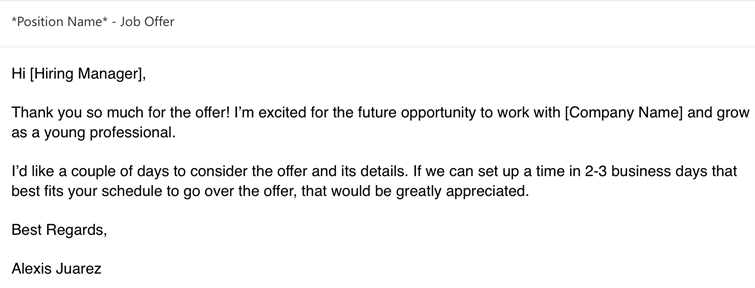6 Essential Tips on How to Negotiate a Job Offer

At Ascent, we provide free resources to help you throughout college, which may include links to third-party websites (where security and privacy policies may differ from Ascent’s). For our disclaimer, please click here.
After acing the job interview, you finally received your job offer. But, is the salary less than you expected? Was there a particular benefit you were hoping to receive? Negotiating a job offer plays a big role in your interview process and is an essential part of the professional world – so don’t settle if you know you’re worth more than the offer.
You may think it’s uncommon to negotiate a job offer, but according to a recent study from JDP, 41% of candidates negotiate every job offer.
Entering the professional world can seem scary, but don’t worry – here are 6 essential tips to help you negotiate your first job offer:
- Think Over Your Offer
- Know Your Worth
- Be Firm, but Flexible
- Shoot for the Stars
- Be Ready to Answer the Tough Questions
- Consider the Whole Package
1. Think Over Your Offer
After you get your job offer – it’s official – they want you! Your hard work has paid off. You showed them what you were made of and showcased your skillset, but now is the time to determine if the offer is what you were expecting.
If you aren’t 100% sold on the offer, you can ask the hiring manager for 2-3 business days to think it over. I know it’s exciting, and the rush of receiving your first offer may be exhilarating, but don’t accept it right away if you aren’t satisfied with it.
Make sure you are upfront and transparent with the hiring manager that you need a couple of days to make a decision, and then set up a future meeting to discuss the offer further.

2. Know Your Worth
If you haven’t already done so, you can do a quick search to find the salaries of people with your title in your local area. Sites like Glassdoor and Salary.com will be your best friend during the interview and negotiation process and help you understand what you should expect to be paid. According to The Balance Careers, 50% of employers plan to negotiate for entry-level job salaries, so don’t be intimidated.
Know your worth and build your business case if you believe your salary should be higher than what you were offered. Don’t negotiate just to negotiate. If the job posting asked for 3+ years in Microsoft Excel, but you only have 2 years of experience, then you may not be in the best position to negotiate your offer. However, if the job posting asked for 2 years of experience in management and you have 4 years of experience, then you may have some leverage.
3. Be Firm, but Flexible
Negotiating your first job offer is not like two lawyers debating each other on Law & Order. This is real life and at the end of the day, if this is the company you want to work for, you must be courteous and respectful. The hiring managers will be your co-workers, so you don’t want to rub them the wrong way.
You can still be firm, but flexible! After you graduate, you should know the average range of salary for students with your major and experience. Once you know your expected salary, determine what you’d be willing to accept.
TIP: Constructing a budget to determine what your monthly expenses will be is a great way to help determine the lowest salary you can afford to take.
Learning how to budget isn’t rocket science
Depending on the company, they may have a set budget for a new hire, so don’t beat yourself down if it’s not the exact amount you were hoping for. Being flexible in situations like these might be in your best interest if it is a company you want to work for, the team dynamic is fantastic, and there is a lot of room for individual growth!
TIP: Be flexible and creative – see our suggestions under #6 (Consider the Whole Package).
4. Shoot for the Stars
Shoot for the stars – but don’t shoot too high!
After receiving the job offer, The Balance Careers suggests taking a couple of days to do your research of salary ranges for your desired position. If you find from your research that your offer is not within a competitive range, you may choose to counteroffer with a salary that is higher, but reasonable. The worst they can say is no.
Indeed offers some great examples of how you can counteroffer with confidence. For example, if they initially made an offer of $60,000, but you were expecting a higher salary, you may choose to counteroffer at $65,000.
Shooting for a salary a little higher than you are willing to accept will give you the wiggle room and the opportunity to receive the offer that you are striving towards. Meeting in the middle is an excellent negotiation tactic because it is a win-win situation for both you and the hiring manager.
However, don’t shoot too high. For example, if the company initially made an offer of $50,000, and you made a counteroffer of $80,000, there is a good chance that not only will the offer get rejected, but the hiring manager may think you didn’t do your research.
5. Be Ready to Answer the Tough Questions
As in any situation you encounter, you want to be well-prepared. It’s no different when negotiating.
Preparing to answer tough questions from the hiring manager is vital. Ask your mentor or anyone else you seek professional advice from to help run through questions that a hiring manager may ask you. Business Insider also pulled together 31 tough interview questions so you can prepare to answer them with ease. Here are some questions to be ready for:
- What is your expected base salary?
- How do you see yourself growing in this company?
- How are you best motivated to accomplish your goals by your managers?
Additionally, always have a Plan B ready. If the hiring manager does not accept your counter offer, Live Career offers some great tips on how to move forward with the company if you’re still interested in the position, such as negotiating other employee benefits and bonuses. It is essential to read the room and, after all, you don’t want to lose your new job opportunity after negotiating your first job offer.
Make sure you can ask the tough questions, as well. This is a two-sided process – both you and the hiring manager are in charge. Prepare several questions for the hiring manager about the company culture, individual growth, benefits, or anything else that you may think is important to ask related to total compensation and career growth. Here are a few examples of questions that you can have prepared:
- How are promotions or salary raises given?
- What metrics do managers use to evaluate the success of their employees?
- Aside from the base salary, what other benefits are offered?
6. Consider the Whole Package
Last, but certainly not least, make sure you think of the whole package. At the end of the day, you are negotiating a job offer, not just the salary. Negotiating a job offer and negotiating a salary are two completely different things.
Coming out of college, many students only care about how much they are making. But what they don’t realize is that sometimes the benefits outweigh the salary. According to Plan Adviser, 80% of Americans would prefer a job with high-quality work benefits instead of a job that paid 30% more salary, but with no benefits.
Some of the benefits that you may consider looking into are:
- Medical, dental, vision, and life insurance
- A signing or relocation bonus
- Annual bonus
- Stock options
- 401K match
- Vacation time
- Paid time off for community service
- University tuition or student loan reimbursement
- Professional development certifications
- Parking or cell phone reimbursement
- And many, many more!
You are finally getting your foot in the door at the company of your dreams. Launch into your future career by learning the importance of negotiating your first job offer.
For more tips on how to transition from college to the professional world, read our blog Getting Ready for Your First Job Out of College.


